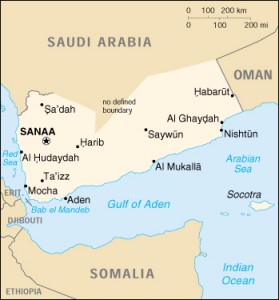Yemeni military officials say fighting in two southern towns has left 27 fighters allegedly linked with al-Qaeda and seven Yemeni soldiers dead, as the army continues its offensive aided by U.S. officials and combat troops.
 The latest spate of battles took place near Zinjibar, the capital of southern Abyan province, and nearby Jaar, continuing from Friday until early Saturday. Earlier in the week, 6 Yemeni soldiers and 22 alleged militants were killed on Wednesday.
The latest spate of battles took place near Zinjibar, the capital of southern Abyan province, and nearby Jaar, continuing from Friday until early Saturday. Earlier in the week, 6 Yemeni soldiers and 22 alleged militants were killed on Wednesday.
Clashes between militants and government forces have escalated in recent weeks, following the Obama administration’s announcement that U.S. Special Operations forces had been sent inside the embattled Gulf state.
One American official, speaking to the Associated Press on condition of anonymity, said the new troops being sent to Yemen are special operations forces who work under more secretive arrangements than conventional U.S. troops. It is likely that the role of these troops goes well beyond the “routine training” claimed by the Pentagon spokesman, which would mark yet another instance where Obama sends U.S. soldiers into action abroad without the consent of Congress or the American people.
Since the new offensive began on May 12, about 300 people have been killed, according to reports. This includes dozens of civilians.
But the number of civilians killed because of U.S. intervention is undoubtedly much larger than that. The Obama administration has stepped up its drone war in Yemen with the support of the Hadi government, who is reliably taking orders from Washington just as the former dictator was.
President Obama recently approved the CIA’s “signature strikes,” which includes the authority to bomb and kill individuals they can’t identify. Up to 12 civilians, for example, were killed by a U.S. drone on May 15, in a follow-up strike aimed at people who had gathered to the site of a previous drone strike which targeted alleged al-Qaeda militants.
The bloodshed caused by the Obama administration’s offensives in Yemen is probably detrimental to US security. Jeremy Scahill, reporting for Nation, exposed in February after visiting Yemen how U.S. airstrikes that kill civilians and those ill-defined as militants – along with support for the brutal Yemeni government – foments anti-Americanism and fuels international terrorism.
Charles Schmitz, a Yemen expert at Towson University in Maryland, told the Los Angeles Times, “The more the U.S. applies its current policy, the stronger Al Qaeda seems to get.”


